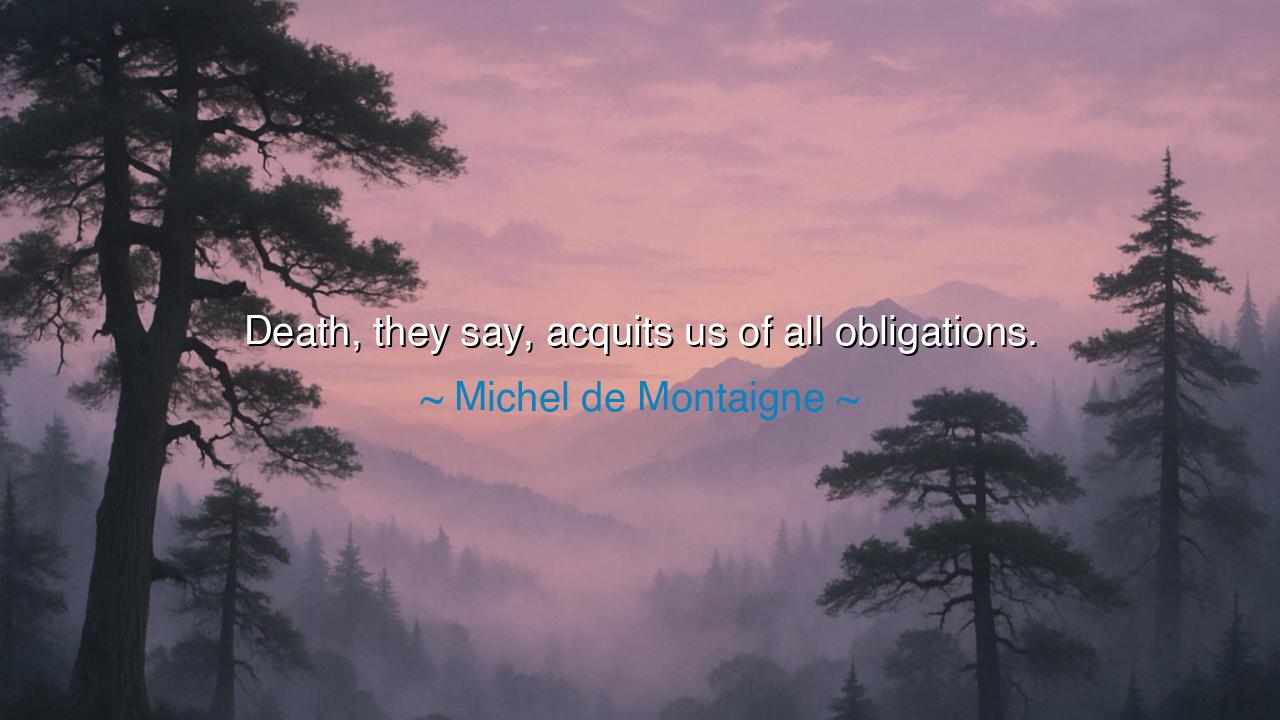
Death, they say, acquits us of all obligations.






In the quiet, meditative voice of Michel de Montaigne, the philosopher of the inward life, we hear the sobering truth: “Death, they say, acquits us of all obligations.” These words, though simple, hold within them a depth as vast as eternity. They are not uttered in despair, nor in cynicism, but in calm reflection upon the limits of human striving. Montaigne, who spent his life contemplating the nature of existence, reminds us that in the end, death releases us from every bond—of labor, duty, fear, and even promise. When the breath leaves the body, no king may command us, no debt may bind us, no law may summon us. In that instant, all the burdens of this world fall away, and only the truth of how we have lived remains.
Born in sixteenth-century France, an age torn by war and faith’s division, Montaigne withdrew from public life to his tower, where he wrote his Essays—meditations upon the soul’s struggles and the vanity of human ambition. When he speaks of death as an acquittal, he does not mean it as license for negligence, but as a mirror for wisdom. He teaches that our obligations, though necessary in life, are transient, and that remembering their impermanence is the surest path to freedom. The man who knows that death will one day absolve him of all duties learns to bear them with serenity; he neither clings too tightly nor shirks too soon.
To understand Montaigne’s insight, one must see death not as an enemy, but as the final judge—the great equalizer of kings and beggars. In life, we are tangled in endless responsibilities: to family, to nation, to conscience. We toil to meet expectations, to uphold names, to gather wealth. Yet, when the shadow of death draws near, the scales are wiped clean. The emperor and the slave lie alike in the dust, their burdens forgotten, their titles dissolved. Thus, Montaigne’s phrase is both a comfort and a warning: comfort, because death ends all suffering; warning, because what remains after acquittal is only the record of our deeds—the measure of how we bore our obligations while they still bound us.
The ancients, too, understood this truth. Consider Socrates, who, condemned to die, spoke serenely to his followers of the soul’s immortality. “Death may be the greatest of blessings,” he said, “for it releases us from the tyranny of the flesh.” In drinking the hemlock, he fulfilled all the laws of Athens, yet transcended them in spirit. His obligations ended with his final breath, but his virtue endured beyond it. In this way, Montaigne stands as heir to that ancient wisdom: that to meditate on death is to live rightly. For when we remember that we shall be acquitted of all earthly bonds, we learn to carry them more nobly while they remain.
Yet, there is a paradox hidden within his words. If death frees us from obligation, does this mean that nothing matters? Montaigne would say the opposite. It is precisely because everything ends that everything matters. Knowing that we shall one day be released from our tasks makes the way we fulfill them sacred. The fleetingness of duty lends it beauty. The parent who raises a child, the friend who keeps a promise, the citizen who serves his people—all know that these acts will vanish in time. Yet in performing them, they give meaning to their brief existence. Death may erase obligations, but not the honor with which we held them.
In this, we find the heart of Montaigne’s teaching: to live each day as one preparing to be acquitted. Do your work as though it were your last act, love as though no tomorrow were promised, forgive as though you yourself were already forgiven. For the final absolution will come not from others, but from the silence that follows life. Those who live in this awareness do not fear death; they greet it as the closing of a circle, the completion of duty, the release of a soul that has kept faith with itself.
So, O seeker of wisdom, take heed. Let not your obligations enslave you, but neither should you despise them. Fulfill them with courage and compassion, for they are the forge in which the spirit is tested. And when death comes—as it surely will—you shall find, like Montaigne, that it does not come as punishment, but as acquittal. It is not the jailer’s key, but the gate to peace.
Thus, live with honor, that when you are at last acquitted of all obligations, you may stand unburdened—not only in body, but in conscience—ready to step beyond the world’s toil into the quiet eternity that awaits all who have truly lived.






AAdministratorAdministrator
Welcome, honored guests. Please leave a comment, we will respond soon